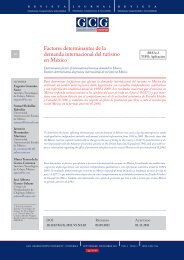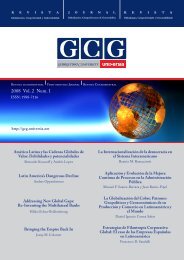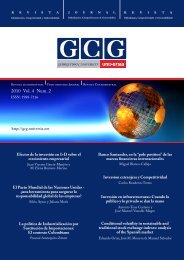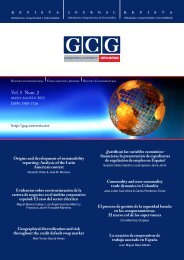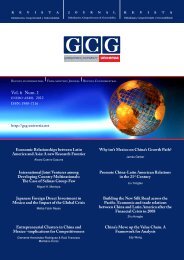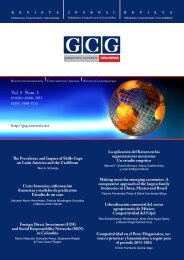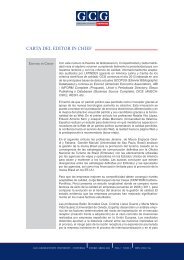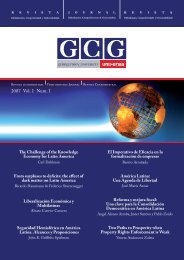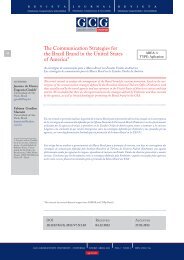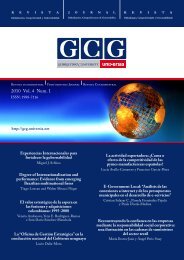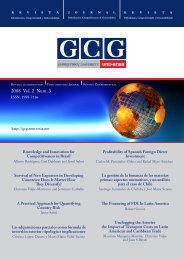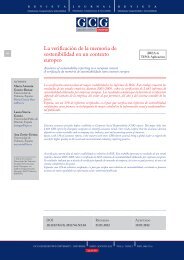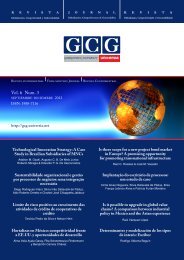Vol. 5 Num. 3 - GCG: Revista de Globalización, Competitividad y ...
Vol. 5 Num. 3 - GCG: Revista de Globalización, Competitividad y ...
Vol. 5 Num. 3 - GCG: Revista de Globalización, Competitividad y ...
- No tags were found...
Create successful ePaper yourself
Turn your PDF publications into a flip-book with our unique Google optimized e-Paper software.
Financial Integration in the Americas, Changing Geopolitics and Brazilian Foreign Policy18to the mid to late 1990s, subsequently in the period from 2005-2010 these countries showempirical evi<strong>de</strong>nce of <strong>de</strong>veloped world economic characteristics.Theoretically, we have adopted the notion of hegemony to explain the changing politicaleconomy of South America in general and the Southern Cone in particular. There are a numberof powerful arguments in favour of this approach. In the first instance, American foreignpolicy and inter-American or hemispheric relations have been frequently explained in theseterms (Augelli & Murphy, 1988; Gill, 1993; Ruggie, 1998). Until relatively recently the UnitedStates was seen as the hegemonic power across the Americas. Since the 1990s we haveseen the rise of Brazil in the region and the emergence of an overt policy goal of regionallea<strong>de</strong>rship on the part of Brazil. Whilst the Brazilian political elite have sought a lea<strong>de</strong>rshiprole it has been very careful to avoid accusations of attempting to dominate the other countriesor the region. In <strong>de</strong>bates on the merits on Mercosur, the problem of a prepon<strong>de</strong>rance ofpower residing with Brazil has been consistently to the fore. Brazil for its part has attemptedto diffuse this issue by positing itself as merely building a political consensus in the region.The term consensual hegemony has been used in <strong>de</strong>scribing this process (Caldas, 1998;Burgess 2008). The notion of hegemony in the field of international relations has its origins inGramscian political philosophy. In essence, achieving hegemony means convincing othersthat their interests are similar to those of the hegemonic power. It can be seen then as beingless about coercion and more about the normative power of i<strong>de</strong>as disseminated from thehegemon. The importance attached to the flow of i<strong>de</strong>as across political space means that anuanced view of inter-state relations is required. From this perspective it is no longer sufficientto view states as simple atomistic units that are differentiated by their relative power.Instead, societal structure and i<strong>de</strong>ologies play an important role as does civil society. Thusinternational relations are not simply reducible to States; transnational actors become animportant part of the picture.<strong>GCG</strong> GEORGETOWN UNIVERSITY - UNIVERSIA SEPTIEMBRE-DICIEMBRE 2011 VOL. 5 NUM. 3 ISSN: 1988-7116One such set of actors, the financial markets, is acknowledged as being extraordinarilyinfluential. As a group of actors, they have the ability to shift vast resources from sovereignstate to sovereign state and can alter the balance of economic power. They have a <strong>de</strong>greeof prestige and much media is <strong>de</strong>dicated to their actions and opinions. They are a key constituencyfor nation-states seeking to achieve political change at a local or international level.In many respects they embody the relationship between objective and subjective realities inthat we see their ability to change the economic reality of a region co-existing with phenomenasuch as confi<strong>de</strong>nce and sentiment. To explain Pax America, Gill (1993) argues that weneed to look at an array of social forces. For <strong>de</strong>ca<strong>de</strong>s these social forces ten<strong>de</strong>d to cementUS power across the Americas. A key element of hegemony is the i<strong>de</strong>a of its ‘naturalness’.If social actors come to see a power relationship as natural then it becomes stronger. Thisis at the heart of our argument; if financial markets come to perceive Brazil as no longerperipheral but increasingly integrated into the global economy this lends cre<strong>de</strong>nce to thenotion that Brazil is no longer perceived as belonging in the emerging market or <strong>de</strong>velopingcountry category. The data presented in this paper shows that this is in<strong>de</strong>ed the case. Animportant and long-standing goal of Brazilian foreign policy has been the attempt to alignthe interests of Brazil to those of the other countries in the region. Market participants nowsee this process of alignment as un<strong>de</strong>rway. In other words, a key step has been taken in theachievement of consensual hegemony. A second major tenet of their foreign policy has beento resist US domination, or in other words, the satellitisation of South America, and it appp:16-29



